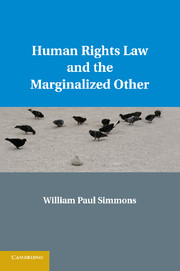Book contents
- Frontmatter
- Brief Contents
- Contents
- Preface
- Introduction
- Part I Deconstruction of Human Rights Law
- Part II Phenomenology of the Saturated Other
- 3 Derrida, Levinas, and the Rights of the Other
- 4 The Saturated Other
- Part III Human Rights of the Marginalized Other
- Conclusion Working with the Marginalized Other to Deconstruct and Reinvigorate Human Rights Law
- Bibliography
- Index
4 - The Saturated Other
from Part II - Phenomenology of the Saturated Other
Published online by Cambridge University Press: 07 October 2011
- Frontmatter
- Brief Contents
- Contents
- Preface
- Introduction
- Part I Deconstruction of Human Rights Law
- Part II Phenomenology of the Saturated Other
- 3 Derrida, Levinas, and the Rights of the Other
- 4 The Saturated Other
- Part III Human Rights of the Marginalized Other
- Conclusion Working with the Marginalized Other to Deconstruct and Reinvigorate Human Rights Law
- Bibliography
- Index
Summary
Chapter 3 argued that human rights must be grounded in a transcendence of the Other but concluded that Derrida’s and Levinas’ conception of transcendence provided little ground for making complex political decisions. This inability was traced back to Derrida’s reliance on the purified transcendence of the tout autre and Levinas’ failure to conceive of an individualized Other, which was most apparent in not naming the Palestinian as an “Other.” Two major questions present themselves: Is there a way of conceiving of the Other as transcendent, concrete, and individualized? Can a type of transcendence be conceived that will adequately deconstruct and reinvigorate human rights law; that will overcome the original violence of the hegemonic system and provide a new foundation for human rights?
In this chapter, I argue that Enrique Dussel’s eclectic and voluminous writings provide a path for addressing one of the most intractable aporiai in heteronomic thought, namely the individuation of the transcendent Other, and thus moves us toward a deconstruction and reinvigoration of human rights law. I situate my interpretation of Dussel’s theory of transcendence within the context of Jean-Luc Marion’s recent phenomenologies of the saturated phenomena. I argue that Dussel’s account of the Other closely resembles the hyper-presence of Levinas’ writings and Marion’s phenomenology of the saturated phenomena without much of Levinas’ and Marion’s noted theological baggage. Dussel’s philosophy with its firm adherence to the marginalized human Other as individualized saturated phenomenon is able to make political judgments where Levinas was notoriously tongue-tied. In addition, Dussel’s recent writings endeavor to synthesize this transcendental ethics of the Other with the participatory or discursive democracy advocated by Arendt, Benhabib, Habermas, and Karl Otto-Apel. Nonetheless, Dussel will insist that such a political thought must continuously be deconstructed by the a priori ethical relationship with the Other, thus addressing the propensity of discursive democracy to cauterize the Other, rendering him or her aneu logou.
- Type
- Chapter
- Information
- Human Rights Law and the Marginalized Other , pp. 107 - 126Publisher: Cambridge University PressPrint publication year: 2011

